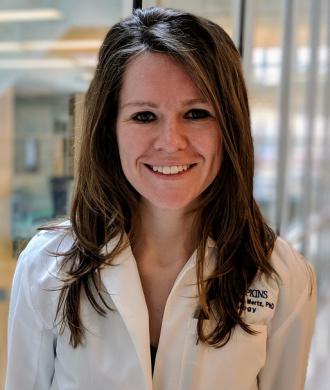Christina
Nemeth Mertz
,
PhD
Breadcrumb
Home Patient Care Faculty & Leadership Christina Nemeth Mertz, PhD
About
Dr. Christina Nemeth Mertz attended Hamilton College in Clinton, NY, where she graduated with a bachelor’s degree in Neuroscience in 2006. She completed her PhD in Neuroscience at Emory University in Atlanta, GA, in 2014 where she studied cerebral microvascular disease and the role of chronic inflammation in the pathology of neurodegeneration and the development of affective disorders. In 2015, Dr. Nemeth Mertz began a postdoctoral fellowship at the Kennedy Krieger Institute examining targeted and combination therapies following neonatal brain injury under Drs. Michael Johnston and Mary Ann Wilson, and later in rare genetic pediatric leukodystrophies under Dr. Ali Fatemi.
Research Summary:
My primary research interest is the application of relevant cell and animal model systems to understand neurogenetic and neurodevelopmental disorders. While my background in behavioral neuroscience and model animal systems brought me to Kennedy Krieger and led to the characterization of cell and animal models of rare pediatric leukodystrophies, the need to dive deeper into the molecular consequences of monogenetic diseases such as adrenoleukodystrophy (ALD) and Leukoencephalopathy with Brainstem and Spinal cord involvement and Lactate elevation (LBSL) has become a main focus of research at the Moser Center for Leukodystrophies. Towards a better understanding of both ALD and LBSL, we have two main goals: 1) use animal models and our own rare patient samples to detect novel features of pathology via developmental and functional studies, as well as through the analysis of large and complex sequencing data sets; and 2) use retrospective data and samples to identify biomarkers that may predict disease phenotype and prognosis. Beyond these goals, we work closely with collaborators at the Kennedy Krieger Institute, Johns Hopkins School of Medicine, and beyond to test therapeutic efficacy as well as platforms for drug delivery.
The Moser Center for Leukodystrophies at Kennedy Krieger has garnered a close-knit community of patients, families, and donors. As a research scientist, understanding and working closely with the community that I serve has been a unique experience, changing the meaning of ‘translational research’, and has only fueled my interest in these diseases.